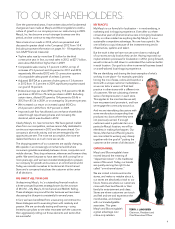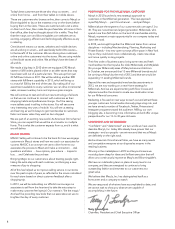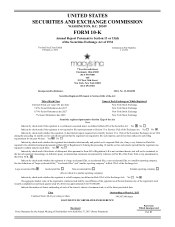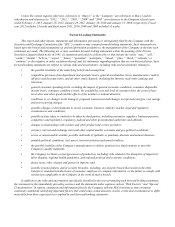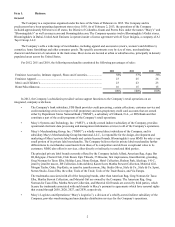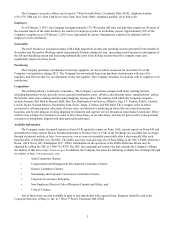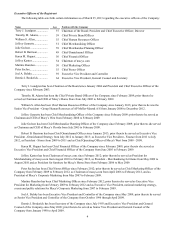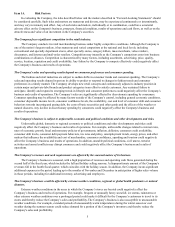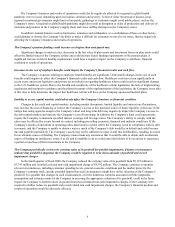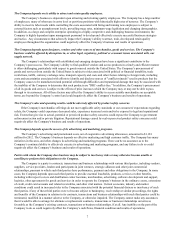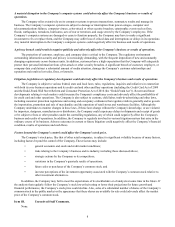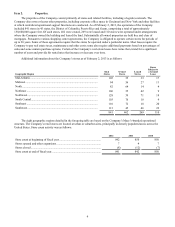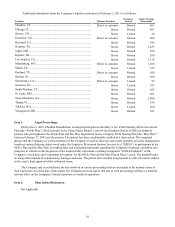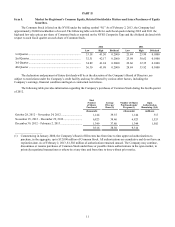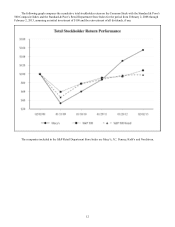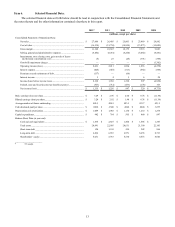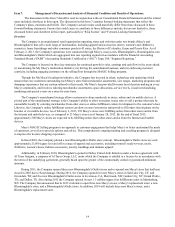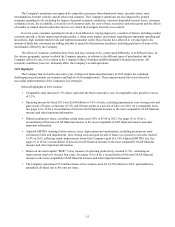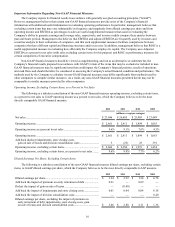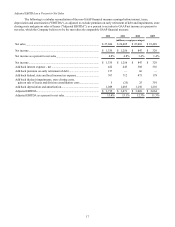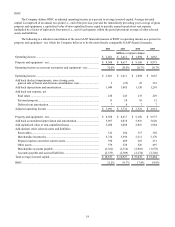Macy's 2012 Annual Report Download - page 13
Download and view the complete annual report
Please find page 13 of the 2012 Macy's annual report below. You can navigate through the pages in the report by either clicking on the pages listed below, or by using the keyword search tool below to find specific information within the annual report.8
A material disruption in the Company’s computer systems could adversely affect the Company’s business or results of
operations.
The Company relies extensively on its computer systems to process transactions, summarize results and manage its
business. The Company’s computer systems are subject to damage or interruption from power outages, computer and
telecommunications failures, computer viruses, cyber-attack or other security breaches, catastrophic events such as fires,
floods, earthquakes, tornadoes, hurricanes, acts of war or terrorism, and usage errors by the Company’s employees. If the
Company’s computer systems are damaged or cease to function properly, the Company may have to make a significant
investment to fix or replace them, and the Company may suffer loss of critical data and interruptions or delays in its operations.
Any material interruption in the Company’s computer systems could negatively affect its business and results of operations.
A privacy breach could result in negative publicity and adversely affect the Company’s business or results of operations.
The protection of customer, employee, and company data is critical to the Company. The regulatory environment
surrounding information security and privacy is increasingly demanding, with the frequent imposition of new and constantly
changing requirements across business units. In addition, customers have a high expectation that the Company will adequately
protect their personal information from cyber-attack or other security breaches. A significant breach of customer, employee, or
company data could attract a substantial amount of media attention, damage the Company’s customer relationships and
reputation and result in lost sales, fines, or lawsuits.
Litigation, legislation or regulatory developments could adversely affect the Company’s business and results of operations.
The Company is subject to various federal, state and local laws, rules, regulations, inquiries and initiatives in connection
with both its core business operations and its credit card and other ancillary operations (including the Credit Card Act of 2009
and the Dodd-Frank Wall Street Reform and Consumer Protection Act of 2010 (the “Dodd-Frank Act”)). Recent and future
developments relating to such matters could increase the Company's compliance costs and adversely affect the profitability of
its credit card and other operations. The Company is also subject to customs, child labor, truth-in-advertising and other laws,
including consumer protection regulations and zoning and occupancy ordinances that regulate retailers generally and/or govern
the importation, promotion and sale of merchandise and the operation of retail stores and warehouse facilities. Although the
Company undertakes to monitor changes in these laws, if these laws change without the Company's knowledge, or are violated
by importers, designers, manufacturers or distributors, the Company could experience delays in shipments and receipt of goods
or be subject to fines or other penalties under the controlling regulations, any of which could negatively affect the Company's
business and results of operations. In addition, the Company is regularly involved in various litigation matters that arise in the
ordinary course of its business. Adverse outcomes in current or future litigation could negatively affect the Company’s financial
condition, results of operations and cash flows.
Factors beyond the Company’s control could affect the Company’s stock price.
The Company’s stock price, like that of other retail companies, is subject to significant volatility because of many factors,
including factors beyond the control of the Company. These factors may include:
• general economic and stock and credit market conditions;
• risks relating to the Company’s business and its industry, including those discussed above;
• strategic actions by the Company or its competitors;
• variations in the Company’s quarterly results of operations;
• future sales or purchases of the Company’s common stock; and
• investor perceptions of the investment opportunity associated with the Company’s common stock relative to
other investment alternatives.
In addition, the Company may fail to meet the expectations of its stockholders or of analysts at some time in the future. If
the analysts that regularly follow the Company’s stock lower their rating or lower their projections for future growth and
financial performance, the Company’s stock price could decline. Also, sales of a substantial number of shares of the Company’s
common stock in the public market or the appearance that these shares are available for sale could adversely affect the market
price of the Company’s common stock.
Item 1B. Unresolved Staff Comments.
None.


